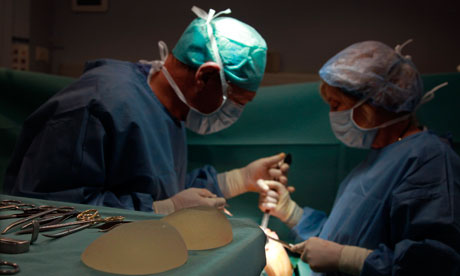
Bruce Keogh, the medical director of the NHS, deserves praise for his rapidly produced interim report on Poly Implant Prostheses (PIP). He recommended that 40,000 women who have received PIP breast implants in Britain be contacted and "offered further procedures subject to clinical need and taking full account of the wishes and concerns of the patient".
But his report also reveals an astonishing regulatory failure. It identifies weaknesses in UK health decision-making. And it shows why opening up the NHS to private providers is such a dangerous and ill-considered venture.
Breast implants in the UK are regulated under an EU medical devices directive. The PIP implant was approved in 2000 on the understanding that it used medical grade silicone. Exports to the UK began that year. The Medicines and Healthcare products Regulatory Agency (MHRA) first noted concerns about the PIP implant in 2008. This was two years after surgeons had begun publicly reporting their own anxieties about these prostheses. In 2007, R B Berry wrote: "That a high cohesive gel implant could have suffered such a massive failure only three years after implantation is very worrying and, in this case, not only had silicone migrated to a regional lymph node, but the exposed silicone gel appears to have provoked an inflammatory response with the production of a significant quantity of serous exudate. In view of these two reports the reliability of PIP implants must be questioned and, for myself, I intend to discontinue their use in favour of implants from other manufacturers." Did the MHRA read this report? If not, then what is the point of an agency that does not keep up with safety signals reported in the medical literature? If it did, then why did it not order an urgent safety review?
The only reasonable conclusion can be that the MHRA failed to do the job the public expects – to protect it from harm. Last December the French regulatory authorities advised women, based on their assessment of the evidence, to consider removal of PIP implants. The MHRA responded on the same day by disagreeing. The MHRA argued that it did "not believe that the associated risks of surgery from breast implant removal can be justified without further evidence". This judgment was hasty, cavalier, and completely counter to concerns about PIP implants. Keogh did his best to offer collegial support to the MHRA. He wrote that he agreed that there was "no specific safety concern" and that there was "no clear evidence at present that patients with a PIP implant are at greater risk of harm than those with other implants".
But his recommendation that women should have free removal of implants (if they are concerned) in effect overturned not only the MHRA's advice but that of the chief medical officer, released on the same day. She told women who had received PIP implants that they "should not be unduly worried".
But that view was quite literally incredible given that women had received implants containing an industrial-grade silicone gel that was not approved for human use. Women should certainly be worried that regulatory procedures in place in the EU and UK have failed them so spectacularly.
One final concern. The British government's health and social care bill will open up the NHS to private sector providers. The events of the past month show why this policy is so misguided. When something goes wrong in the NHS the entire organisation can be mobilised to address the problem coherently, transparently, equitably, and to the very highest of standards. But in the case of PIP implants, over 95% of which were done by private providers, what have we seen? Andrew Lansley, the health secretary, has had to castigate private cosmetic clinics for failing to gather and provide high-quality data on their procedures. The best he could do was ask that they "take similar action" to the NHS; he could not require such action. Keogh went further: "We can place no reliance upon [their] figures."
Yet this is the future for the NHS. A system of healthcare that cannot be held accountable by the government; one that has no obligation to collect or supply accurate information about what it is doing; one that fiercely resists its duty of care to patients; and one that is more concerned with cost than it is with quality. The evidence is before us: it's time to kill this bill.
• A longer version of this article appears in the current edition of the Lancet
• Follow Comment is free on Twitter @commentisfree

